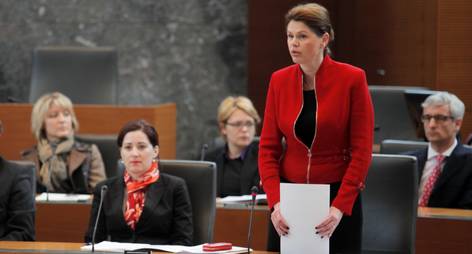NEWS
Prime Minister Alenka Bratušek in her answer to parliamentary questions: "Any measures that are only on paper are not enough. They should be brought to life."
The Prime Minister of the Republic of Slovenia, Alenka Bratušek, answered questions from deputies in the National Assembly for the first time since she took office and after six days at the helm of the Government. The first to ask a question was Mihael Prevc from the Slovenian People's Party Deputy Group in connection with the first economic measures, continuation of the reform process and priorities of the new Government. In her reply, Prime Minister Bratušek stressed that, considering the situation in which she took over the Government, there was not much time to prepare the Government's work programme in peace, which is why "the Government's anti-crisis plan is based on continuing the implementation of all well-conceived measures during the previous Government's term of office and on giving emphasis to the areas neglected by the previous Government, i.e. restarting the economy and new job creation." Fiscal consolidation, management of state-owned assets in one place and rehabilitation of the banking system are the priorities of the Ministry of Finance, added the Prime Minister and went on saying that the stabilisation programme also continued in accordance with the adopted regulations which will be amended if proved necessary. In this context, the Prime Minister announced the strengthening of the Bank of Slovenia’s role. "We are all aware of the urgency of the banking system rehabilitation and that it should be continued," stressed Prime Minister Bratušek and added that this process had not come to a halt after 8 January as claimed by Mr Prevc; however, no measure on paper only is enough: it should be implemented and brought to life. The Prime Minister also replied to the opposition deputies who expressed their concerns over inadequate measures and asked them if they considered their implementation inferior because it was done by another government: "This Government has for the time being done nothing different than planned, yet everyone talks about the emergency of aid".
New Slovenia's deputy, Matej Tonin, raised the question of resolving the economic and financial crisis in Slovenia. The Prime Minister replied that there was no document on the projected reduction in the public sector wage bill or the termination of austerity measures as mentioned by the deputy Tonin. On the contrary, "macroeconomic indicators confirm that the situation is not good and that austerity is a must. Wage bill reduction is easy to prepare, but it is difficult to carry out in practice in common accord with the social partners. For this reason, negotiations will begin immediately". Even if it becomes clear that a rise in VAT is necessary, the Government will carry it into effect as the least adverse impact on the economy. There are considerable deviations from the approved budget and the borrowing cannot be stopped in one year as the public finance should first be consolidated, the Prime Minister highlighted in her reply and added that it had been agreed with the ministers to prepare an overview of the financial plans and difficulties encountered by individual ministries. This would provide the basis for preparing a detailed plan of resolving the problems. Budget borrowing will be used principally to restart the economy and to a minimum extent for current expenditure.
Positive Slovenia's deputy Jani Möderndorfer asked the Prime Minister about the real state of public finances. The Prime Minister replied that she would have a complete picture of it within ten days after she had obtained an insight into the balances and plans of each ministry. The outline of the whole situation shows that the planned one billion deficit has been estimated too low, which is, according to the Prime Minister, also confirmed by international institutions. The International Monetary Fund anticipates that Slovenia's budget deficit will reach one-and-a-half billion, not one billion as projected in the budget. "In this respect, EUR 420 million was allocated to two banks, which raised the public deficit by 1.2 per cent of the GDP, which represents adverse heritage of the previous government," stressed the Prime Minister and also pointed to EUR 20 million in Slovenia's liabilities that matured during last year but their payment had been carried forward to this year. The Prime Minister also summarised that Slovenia's public debt rose by seven percentage points to 54 per cent of its GDP during the previous year. "This happened during the term of office of the government which promised the end of borrowing; however, we will not look back, on the contrary, we should look ahead and ensure a continued fiscal consolidation through rationalisation of public spending and austerity," she said. As regards the comparison between Slovenia and Cyprus, the Prime Minister reiterated that Slovenia's banking system was safe and stable and that there was consequently no need to compare it to that of Cyprus. However, she pointed out that those who do so should be aware of the weight of their words, particularly those who had access to and helped shape the country's finances. "There is no need to panic, Slovenia is capable of putting things in order by itself," concluded the Prime Minister, convinced that Slovenia will not require international aid.




